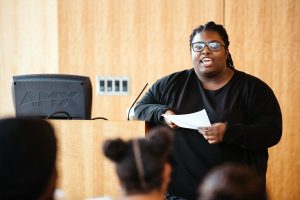For Yolanda Wisher ’98, her visit to Lafayette in February was a return to a crossroads where she first gave in to the words bursting in her brain.

Yolanda Wisher ’98 meets with students and faculty during a reception.
“It feels like family when I come back here,” Wisher said to a room of students, faculty, and staff at Skillman Library, who’d gathered to watch Philadelphia’s poet laureate read her work. “I came here to play basketball, and I quit after the first year.”
The English faculty talked her into staying enrolled. Eventually, Wisher became an English teacher and now a major voice in Pennsylvania poetry.
Her reading was part of Lafayette’s celebration of Black Heritage Month, which focused this year on how different forms of media allow black people to create and shape their lives and the lives of others in their communities.
In addition to Wisher’s talk, the College community took part in discussions with filmmakers, journalists, scholars, activists, and Pulitzer Prize-winning playwright Lynn Nottage.

Danialie Fertile ’16, who organized the College’s Black Heritage Month events, introduces Yolanda Wisher ’98.
“My role is to provoke people. …I believe that community dialogue is an essential ingredient in fostering social change and that theater is one of those places where we can grapple with big ideas and big emotional truths,” said Nottage. “I want there to be lively debate. I want people to get out of their seats to ask questions, and to feel, and to have empathy.”
Nottage presented the John L. Hatfield ’67 Lecture in Kirby Hall of Civil Rights and spoke about her latest play, Sweat. The play explores the social effects of industrial decline in the U.S. and is the result of interviews with residents of Reading, Pa. It opened on Broadway this month.
“Nothing kills community, nothing kills a city, nothing kills culture faster than the loss of its artistic center,” she said. “I think theater is a place where catharsis can still occur, where demons can be exorcised, where artists and audience can be in conversation.”
Wisher read from her recently published collection Monk Eats An Afro, poems steeped in African American culture that often slide into music. Sometimes funny, sometimes angry, Wisher discusses life in Philadelphia as a mother and a black woman.
“Back into the hot breath of West Philly, the sun is setting. The sky is smeared squash, tangerines in a glaze,” Wisher read from her poem “5 South 43rd Street, Floor 2.” “Three girls and one boy jump doubledutch. A white man/ hustles from the video store with a black plastic bag.”
“I always wanted to be a poet who did more than write poetry,” she told the group. “I wanted to use my poetry to effect change.”

